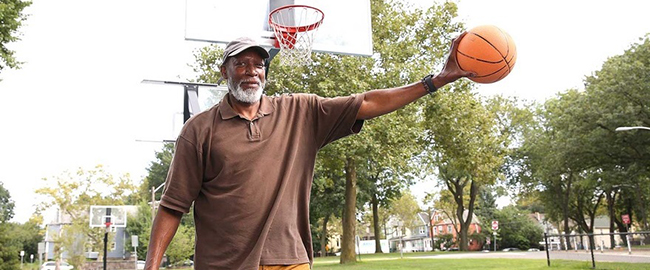And the Man Played On
May 09, 2019
Melvin Taylor is known for his soulful stylings on the saxophone. Playing since the age of 10, he calls himself a “lifer,” having played along the Jersey Shore as a high school student and going on to play in clubs and hotels throughout his career. Since then, he has shared the stage with such soul and R&B greats as Etta James, Aretha Franklin and the Staple Singers. He and his former band, Harvey Scales and the Seven Sounds, even wrote the first song ever to be certified platinum.
It’s safe to say Mel is beloved for his big sound and passionate performances. So when cancer threatened to end his career two years ago, he searched for a medical team that not only would treat his cancer, but also help him stay on stage.
In the summer of 2017, when the nagging pain on the left side of his jaw wouldn’t go away after several months, he finally sought help from a medical professional.
“My wife kept telling me to get it looked at, but I thought, I’m getting old. I’ve been doing this all my life. I’m just breaking down,” says Mel, whose smile and swagger are still effortlessly cool after all these years.
Both his dentist and primary care physician told him the cause of the pain, which had begun to spread to his neck, was likely temporomandibular joint dysfunction (TMJ), but Mel didn’t feel confident in their diagnosis. So he met with an ear, nose and throat doctor who confirmed that he had tonsil cancer.
Dream Team
Armed with a terrifying diagnosis, Mel researched cancer treatment centers in the New Jersey area and landed on John Theurer Cancer Center at Hackensack University Medical Center. Almost immediately, he met with what he calls his “dream team” of physicians, which included radiation oncologist Loren Godfrey, M.D.; oncologist Robert Alter, M.D.; and ear, nose and throat specialist Brian Benson, M.D., who coincidentally played trumpet professionally before medical school.
“Because I’d played for so long, I knew the physical demands Mel put on his body as a professional musician,” Dr. Benson says. “My own trumpet playing truly helped inform my treatment of him.”
Mel vividly remembers meeting with Dr. Benson to discuss his treatment options. Certainly, Mel thought, the doctor could just remove his tonsils and he could get on with life—but he was wrong.
“[Dr. Benson] told me that the cancer had already spread to my lymph nodes, and if we did surgery, I’d never be able to play again,” Mel says, his deep baritone voice shaking.
For someone whose career and quality of life didn’t depend so much on the use of his mouth and throat, physicians would most likely have recommended surgery to remove the tumor followed by radiation. But for Mel, the best option was to skip the surgery and receive seven
weeks of chemotherapy and highly targeted radiation therapy.
“We don’t just treat the disease and send people on their way,” Dr. Alter says. “We try to focus on the entirety of the patient. It’s more about treating the person than treating the disease. For Mel, it was a simple decision.”
But there’s nothing simple about treating cancer, and Mel had a few setbacks along the way, including fatigue and weight loss. “I’m a pretty upbeat guy, but during the peak of it, I just ran out of gas,” Mel says. “I couldn’t play for a minute without feeling pain.”
But he kept playing anyway.
“I told Mel it’s going to be a tough road, but if he could keep playing during treatment, he’d heal better and keep his muscles activated,” Dr. Benson says.
Play On
Incredibly, Mel played his sax throughout his entire seven-week treatment. He didn’t even miss a gig. “It was hard and I had to take more breaks, but I was determined,” he says. For his health, career and quality of life, he’d do it all again.
“Fifteen years ago, I don’t think I could’ve sat with Mel and said the same things for his prospects for such an excellent quality of life,” Dr. Godfrey says. But thanks to more recent advances in therapies and technology, the team at John Theurer Cancer Center delivered a customized treatment plan that returned Mel to a good quality of life.
Now completely cancer-free, Mel credits not only his doctors for treating him, but also music.
“Playing music helped me heal. It took my mind off of it, and it made those seven weeks go a lot faster,” he says. “I played through it.”
These days, Mel performs regularly with a house band at a local hotel. Sometimes he plays in a suit and tie. Sometimes he plays in a brightly sequined button-down and slacks. But he plays. And he always plays it cool.
Learn more about the comprehensive, compassionate cancer care at John Theurer Cancer Center, part of Hackensack University Medical Center.
The material provided through HealthU is intended to be used as general information only and should not replace the advice of your physician. Always consult your physician for individual care.
Sarcoma Slam Dunk

Sports were always a big part of Sherman Edmonds’ life. Growing up to be a towering 6'5", he was destined to play basketball, first at Fairleigh Dickinson University, then overseas in Chile, Santo Domingo and Milan.
Life After Cancer

Awaking one morning with chest pain, Arthur Becker, 68, feared a heart attack and headed to the Emergency Department at Southern Ocean Medical Center.

Toms River Man Battles Prostate Cancer with a Can-do Attitude
When 66-year-old Rudy Manz from Toms River, New Jersey, found out he had an aggressive form of prostate cancer, he fought it with the same can-do attitude with which he approaches life.

Cancer-free After Clinical Trial
When Alain Fortier, 61, began experiencing skin rashes that came and went, he thought it might just be allergies.

